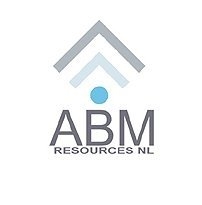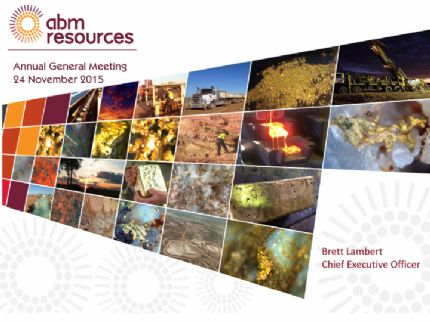 Significant Upgrade for Old Pirate Sets ABM Resources for Trial Mining
Significant Upgrade for Old Pirate Sets ABM Resources for Trial Mining
Perth, Feb 4, 2013 AEST (ABN Newswire) - ABM Resources NL ( ASX:ABU) is pleased to announce a resource update on the Old Pirate Project in the Northern Territory, Australia.
ASX:ABU) is pleased to announce a resource update on the Old Pirate Project in the Northern Territory, Australia.
Significant upgrades compared to the 2012 Resource Estimation (top cut 300g/t model) for Old Pirate:
- 43% increase in ounces of gold in total resource.
- 300% increase in ounces of gold in the Indicated Resource category.
- 27% increase in overall grade.
- 56% increase in Indicated Resource grade.
- Mineralised system remains open to the north, south and at depth.
Includes a maiden Indicated Resource at the Golden Hind Discovery of:
- 113,000 tonnes averaging 16.45g/t gold (1g/t cut-off) for 59,100 ounces including a high-grade core extending from surface to 40 metres of:
- 34,000 tonnes averaging 45.58g/t gold for 49,200 ounces of gold.
Buccaneer Porphyry Gold Project (located 3km from Old Pirate) resource update (including re-optimised model of higher grade zones) pending release shortly.
Darren Holden, Managing Director of ABM said, "These upgrades put the Old Pirate Deposit as one of the best un-developed high-grade deposits at surface in Australia. In particular, our 2012 work identified new zones as well as completed important infill drilling to greatly increase confidence of the model. This mineralised system is now defined over multiple high-grade veins and zones, covering nearly a 2 kilometre strike length, and remains open in several directions. The Western Limb, for example, has potential to more than double in strike length, with high-grade gold at surface, a further 800m along strike from the edge of the resource model. With the ultra high-grade Golden Hind Zone also at surface, along with exceptional metallurgical properties for gravity recoverable gold, we look forward to continuing exploration and implementing our trial mining tests."
Old Pirate Trend 2013 Updated Mineral Resource Estimation
The Old Pirate Trend consists of a series of gold deposits over a 1.8 kilometre strike length consisting of 3 distinct vein clusters of mineralisation named Old Pirate, Old Glory and Golden Hind deposits. Gold mineralisation is hosted primarily within narrow quartz veins of between 20 centimetres and 6 metres in width.
Mineralised zones are up to 40 metres in width and consist of multiple veins hosted primarily within sedimentary shale horizons which are part of a turbidite sequence (interbedded sandstone and shales). Structurally the turbidite sequence has been folded into a faulted anticline. The resource modelling is based on a total of 56,652 metres of drilling of which 12,236 metres were drilled prior to ABM and 44,416 metres were drilled by ABM. In addition, a further 3,355 surface longitudinal trench samples were used to aid with the definition of near surface geology and grade distribution.
Resource modelling consisted of both manually constructed 3 dimensional grade shells and automated grade shells generated from Leapfrog modelling software. All mineralised grade shells were constrained by a geological model constructed by ABM. The grade shells were populated with a block model with minimum block dimensions of 0.5m, 1m, 1m (X,Y,Z). Grade was interpolated based on multiple passes using inverse distance squared and cubed statistical interpolation. Further details are contained in Appendix 1.
Domaining and Resource Category
The Old Pirate Trend has been separated into several domains with differing levels of geological and grade confidence. The Indicated Resource areas consist of zones where geological understanding and sample spacing is considered reasonable as required under the definition in JORC Code (2004, 2012) and are noted in Table 2 (refer to link below).
The Inferred Resource category at Old Pirate also consists of multiple domains which are based on geological modelling. The Inferred Resource category is defined with the lowest level of confidence under JORC Code (2004) and whilst the various grade shells were domained based on geology there is insufficient sample spacing to apply confidence to achieve an Indicated Resource. As a result the Company considers the Inferred Resource as an overall resource which consists of a total of 663 sample points within an inverse distance weighted block model.
The Inferred Resource domains combined into the overall Inferred Resource include:
1. Western Limb below 150m depth utilising drill data only and focused on two drill sections of higher grade. Further work anticipates extending this along strike.
2. East Side vein below 50m depth utilising drill data only with high-grade at depth on two sections.
3. Down plunge extensions of Central Domain to the south utilising drill data only.
4. Old Glory veins utilising surface sampling and wide spaced drilling.
5. SE Veins (two veins to the south east of the Central Zone) defined with surface sampling only.
6. Heartland Deeps - high-grade intersections at depth, north of the Central Zone and possibly downplunge of the Heartland veins within the Central Zone. Defined with drilling only but may link to the Central Zone Domain (Heartland veins) with further work.
7. Golden Hind low grade zone - low grade (~1 to 5g/t) veins to the hanging wall of the main Golden Hind zone identified in drilling.
8. Additional veins - a selection of several veins with short strike length (<20m) are defined by surface sampling and extended to 5 to 20 metres below surface.
The total Inferred Resource is noted in Table 3 (refer to link below).
The Inferred Resource is to be utilised for a scoping study and broad economic analysis and will not be used for detailed mine planning until further work confirms continuity, tonnes and grade.
Comparison with 2012 Resource
In April 2012 the Company released a maiden resource for Old Pirate. This resource was based on wide spaced drill data and consisted of a small Indicated Resource and a larger Inferred Resource. The Inferred Resource was based on averaging gold grades within relatively small grade shells. With the increased geological confidence in the model the 2013 resource was able to upgrade a large portion of the Inferred Resource areas into the Indicated Resource category. It is important to note that the 2012 resource model used a 0.5g/t cut-off whereas the 2013 model uses 1g/t to 3g/t cut-offs. The conversion of high-grade Inferred Resources to Indicated Resources in 2012, along with the increased cut-off resulted in the overall increase in the Indicated Resource grade. A comparison between the 2012 and the 2013 resource estimations is provided in Table 4 (refe to link below).
Coarse Gold and the Effect of Top Cutting
Old Pirate is a high-grade gold system with abundant coarse gold. Coarse visible gold grains up to 5mm across are commonly sighted at surface and in drilling. In general, a larger sample size has a higher probability of capturing a coarse gold particle and hence results in a higher overall grade. The Company regularly has duplicate samples varying 10s to 100s of grams per tonne. The coarse gold effect means that gold liberates easily from simple gravity methods with up to 97% recovery recorded in laboratory metallurgical test results.
However, as a result of the coarse gold, some of the statistical parameters are difficult to quantify with certainty and individual block grades may vary from the modelled grades. The aim of top cutting in resource estimation is to avoid smearing of individual high-grade numbers that are not part of the true population distribution. In coarse gold systems (in absence of mining history) the overall population needs to be reviewed for natural breaks, or population changes need to be taken into account. In addition, there is an argument for very light or even no topcutting to account for the under-sampling of the coarse gold.
The surface longitudinal sampling work conducted by ABM showed zones up to 60m long with average grades in excess of 100g/t and zones over 15 to 25m length to average in excess of 300g/t gold. Individual and selective grab samples (not used in resource work) have shown grades in excess of 2000g/t gold. It is evident that known high-grade veins can be intersected with multiple holes but only return low grade results with the effect of undercalling the grade of the vein. As a further example of the impact of sample size on grade, the Company's gravity recovery test work involved two 100kg samples thought to be identical and grading approximately 20g/t.
However, one sample returned a recovered grade in excess of 40g/t and the other in excess of 140g/t (refer release 05/09/2012). This is further evidence that increasing sample size may have a positive effect on overall grade and the Company expects positive overall reconciliation of grades.
Given the rigorous nature of the sampling and long runs of high-grade samples it is deemed that high-grades are part of the overall population. Based on the assessment of the statistical population, where breaks in population were observed at 240g/t and 364g/t, it is deemed appropriate to report a 300g/t top cut (between population breaks) grade, as well as an uncut grade. The full effect of top-cutting at a variety of grades between 100g/t to 500g/t is noted in Appendix 1. The top-cutting will be further assessed once a mining history is established, which will initially be with the proposed bulk sample / trial mining.
Internally Modelled Resource Work
The Resource Estimation in this report was completed by a combination of ABM staff and included an adherence to a geological model compiled by Dr Rodney Boucher of Linex Pty Ltd. The Company completed a detailed internal report documenting all procedures and parameters used. The Company believes, given the complex geology and coarse gold distribution, that the Company geologists (including the Managing Director as Competent Person) are best qualified to estimate resources within the bounds of the JORC Code 2004/2012. In addition, the resource report was reviewed by directors of ABM as well as 2 separate independent external consultants.
Next Steps - Trial Mining and Bulk Sampling
ABM has applied for permits to conduct a 10,000 tonne bulk sample / trial mining operation at Old Pirate. Permits have been granted by the Central Land Council and by the Titles Division at the Department of Resources (Northern Territory). The Mine Management Plan has been submitted, revised and re-submitted, and is awaiting final confirmation. The purpose of the trial mine is to reconcile tonnes, grade and recovery and forms an essential part of feasibility assessment. The trial mining involves installing a small scale gravity gold recovery plant which can subsequently be upgraded into a full scale plant. Further information on the trial mining details including budget and schedule will be released shortly.
Further targeting
There are several possible extensions, which are NOT included in the 2013 resource estimations, to the Old Pirate trend that warrant further work and could add additional ounces to the overall system. These include:
1. Western Limb along strike to the north: Quartz veins have been exposed in two outcrops approximately 500m and 800m directly along strike from the northern extents of the Western Limb and have returned assay grades up to 34.7g/t gold in surface samples and 32.1g/t in scout drilling. These provide the potential to more than double the strike length of the existing 2013 resource.
2. Eastern Limb along strike to the north: Veins have been exposed approximately 700m along strike from the northern extents of the Eastern Limb (part of the Central Domain model) with surface grades up to 69.2g/t gold.
3. Western Limb at depth: deep drilling on some sections of the Western Limb returned wide high-grade zones which have been included in the inferred resource. However, the lateral (along-strike) extents are yet to be adequately tested and further drilling is required to extend the resource in those areas.
4. Down plunge of Old Pirate fold: Some Inferred Resources are included in a modelled down-plunge extent of the Old Pirate anticline fold nose to the south and remain open down plunge.
5. Further Golden Hind look-a-likes: The Golden Hind Deposit has a very small footprint but contains highgradegold and a significant number of ounces. Golden Hind was only discovered in mid-2012. The Company is planning to conduct further detailed geochemistry along the overall 6 kilometre Old Pirate trend with the aim of targeting further Golden Hind look-a-like systems.
Drilling Results Subsequent to Resource Model
ABM recently received drill-results that were targeting extensions to the Golden Hind system. These included two down plunge diamond holes where assay results returned up to 6g/t gold and RC holes with assays up to 31g/t gold. Overall these results do not have a material effect on the resource and analysis to place these results into geological context is part of the on-going work.
View the complete ABM Resources announcement including all Tables and Figures at the link below:
http://media.abnnewswire.net/media/en/docs/ASX-ABU-623872.pdf
About ABM Resources NL
 ABM Resources (ASX:ABU) is developing several gold discoveries in the Central Desert region of the Northern Territory of Australia. The Company has a multi-tiered approach to exploration and development with a combination of high-grade production scenarios such as the Old Pirate High-Grade Gold Project, large scale discoveries such as Buccaneer, and regional exploration discoveries such as the Hyperion Gold Project. In addition, ABM is committed to regional exploration programs throughout its extensive holdings including the alliance with Independence Group NL at the regional Lake Mackay Project.
ABM Resources (ASX:ABU) is developing several gold discoveries in the Central Desert region of the Northern Territory of Australia. The Company has a multi-tiered approach to exploration and development with a combination of high-grade production scenarios such as the Old Pirate High-Grade Gold Project, large scale discoveries such as Buccaneer, and regional exploration discoveries such as the Hyperion Gold Project. In addition, ABM is committed to regional exploration programs throughout its extensive holdings including the alliance with Independence Group NL at the regional Lake Mackay Project.
![abnnewswire.com]()
Related Companies
Social Media
Share this Article

 ASX:ABU) is pleased to announce a resource update on the Old Pirate Project in the Northern Territory, Australia.
ASX:ABU) is pleased to announce a resource update on the Old Pirate Project in the Northern Territory, Australia. ABM Resources (ASX:ABU) is developing several gold discoveries in the Central Desert region of the Northern Territory of Australia. The Company has a multi-tiered approach to exploration and development with a combination of high-grade production scenarios such as the Old Pirate High-Grade Gold Project, large scale discoveries such as Buccaneer, and regional exploration discoveries such as the Hyperion Gold Project. In addition, ABM is committed to regional exploration programs throughout its extensive holdings including the alliance with Independence Group NL at the regional Lake Mackay Project.
ABM Resources (ASX:ABU) is developing several gold discoveries in the Central Desert region of the Northern Territory of Australia. The Company has a multi-tiered approach to exploration and development with a combination of high-grade production scenarios such as the Old Pirate High-Grade Gold Project, large scale discoveries such as Buccaneer, and regional exploration discoveries such as the Hyperion Gold Project. In addition, ABM is committed to regional exploration programs throughout its extensive holdings including the alliance with Independence Group NL at the regional Lake Mackay Project.





